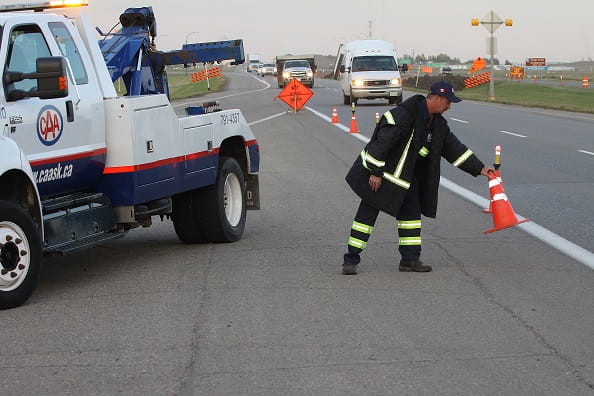Released on August 10, 2017
The Government of Saskatchewan and CAA Saskatchewan would like to remind you, if you see flashing lights ahead, slow to 60 km/hr. Not only is it the law, but also common sense to slow down to 60km/hr for anyone working on the side of the road. It only takes a split second for something to happen at higher speeds - slowing down could be the difference between life and death.“Reducing your speed and being patient can save lives and help to ensure everyone makes it home safely,” Highways and Infrastructure Minister David Marit said. “This is why educating drivers of the importance of slowing to 60 is a priority.”
Drivers in Saskatchewan are required to slow when passing vehicles with their lights activated. This includes emergency vehicles (law enforcement, fire trucks and ambulances) and tow trucks, as well as Ministry of Highways and Infrastructure and municipal equipment.
CAA Saskatchewan, as a dedicated advocate for motorists and the travelling public, regularly promotes safety messages for drivers and travellers.
“The rules of the road are clear,” CAA Saskatchewan Automotive Services VP Scott McIntyre said. “Drivers must slow to 60 km/hr on Saskatchewan highways when passing emergency vehicles, including working tow trucks with safety lights flashing. Unfortunately, many motorists and transport drivers, do not obey this law and often speed by our tow truck operators who are working on our highways, helping other motorists in need. It’s a matter of life and death, and we already have lost one tow truck operator who was a CAA contractor earlier this year. His family is still recovering from his sudden and tragic loss. Do we really want this to happen again to another Saskatchewan family?”

Most drivers know what it’s like to pull over on the side of the road with the startling swooshes of vehicles speeding by. Imagine if you had to deal with that many times every day while working outdoors, away from your vehicle.
Tyrell Digness, a Commercial Vehicle Enforcement (CVE) officer with the Ministry of Highways and Infrastructure for eight years, knows all too well what it’s like for someone to pass him too quickly.
“There is nothing more frightening then sitting in your vehicle and it starts rocking from side to side due to a vehicle passing you too fast,” Digness said. “It’s becoming part of the norm with this job and it really shouldn’t. As a CVE Officer, I spend the majority of my time patrolling Saskatchewan highways looking for overweight and unsafe commercial vehicles and conducting roadside inspections. I’ve been involved in near misses; however, other CVE Officers have had their vehicles hit and severely damaged during traffic stops.”
Dallas Baillie is a tow truck owner and operator with 28 years experience with Baillie Boys Towing. He is a long-time CAA Saskatchewan contractor based in Abernethy and Yorkton, and is also no stranger to roadside danger.
“I have ongoing concerns about working on the side of the road, helping motorists in need, whether it’s for a tire change or a tow,” Baillie said. “Throughout my career, I have encountered my share of close calls of almost being hit by travelling motorists. With the increase of driver distractions, my concerns have certainly elevated especially since my kids now work as tow truck operators too.”
Both men ask the same thing of the motoring public, “Please slow down, we want to go home to our families at the end of the day.” Fines start at $210 for speeding 10 km/hr faster than the maximum 60 km/hr. Collisions that result in injuries or fatalities, may result in criminal charges.
Remember to check the Highway Hotline at www.saskatchewan.ca/highwayhotline or the weekly construction update at www.saskatchewan.ca/residents/transportation/highway-construction-projects/weekly-highway-construction-update for the latest construction projects underway to help plan safe and efficient travel.
This year, both the Ministry of Highways and Infrastructure and CAA Saskatchewan are celebrating 100 years of serving the people of Saskatchewan and promoting road safety.
-30-
For more information, contact:
Steve Shaheen
Highways and Infrastructure
Regina
Phone: 306-527-8740
Email: steve.shaheen@gov.sk.ca
Christine Niemczyk
CAA Saskatchewan
Regina
Phone: 306-791-4327
Email: christine.niemczyk@caask.ca
